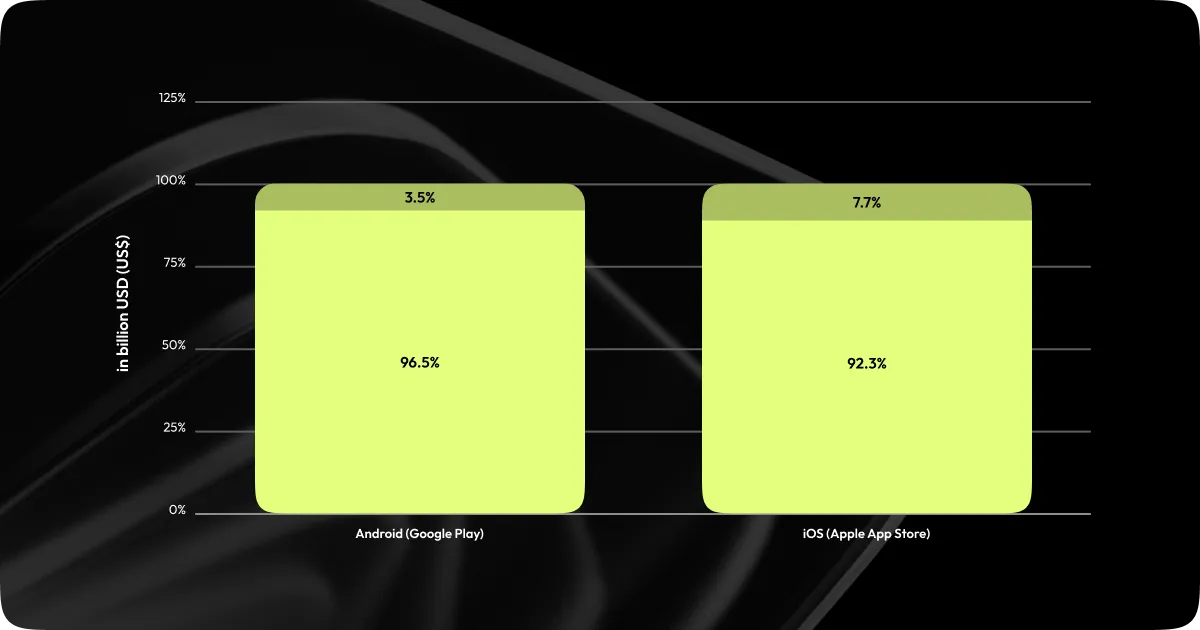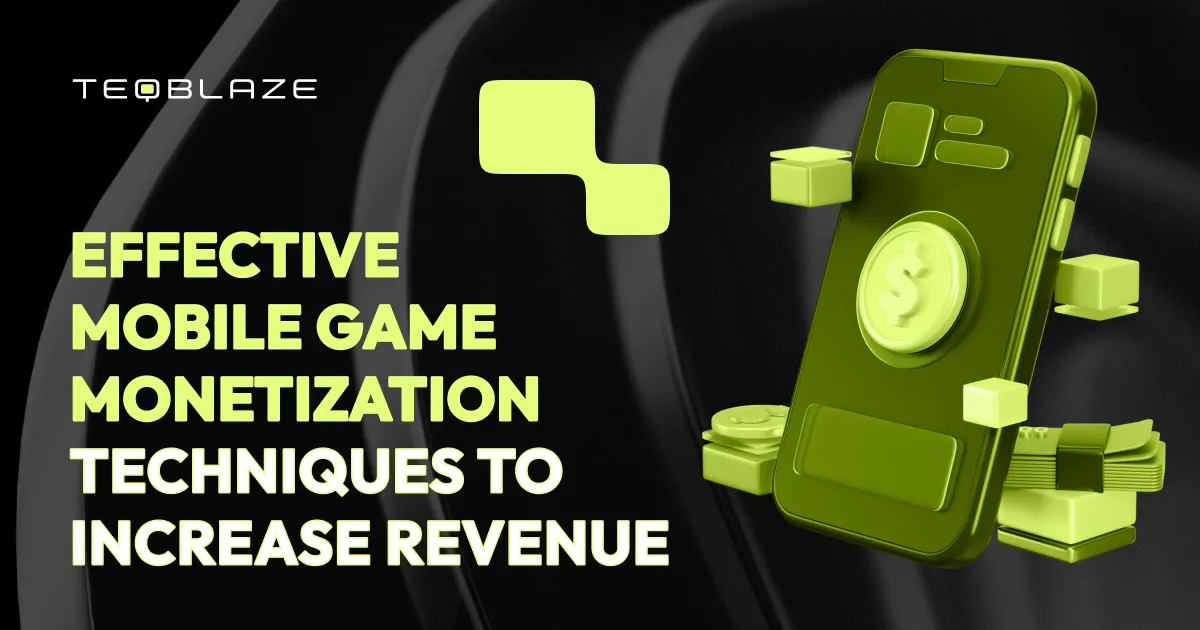After a mobile app is finally launched, you need to think about effective mobile app monetization strategies for successful revenue generation. Whether it is a paid or free app, monetization strategies for mobile games must fulfill users and ensure your company's profitability.
To turn your app's user interactions into income, your plan must be flexible, fitting your goals, product, market, and user experience. A key factor in maximizing revenue is effective cross-device targeting, ensuring that ads reach users consistently across mobile, tablet, and desktop environments. TeqBlaze's 10 years of technology experience and white-label solutions provide valuable insights into user behavior, leading to an improved user experience and increased revenue. This article goes through methods on how to monetize a website or an app, describing each model's pros and cons.
What is mobile game monetization?
Game monetization allows developers to generate revenue from mobile games. Some methods of mobile app monetization with ads allow you to start making money immediately after the product is out. While others will bring income only as a result of its growing popularity. Mobile monetization definition includes in-app advertising, in-app purchases, subscriptions, and paid app methods.
Last year, the total generated revenue from mobile apps was estimated at $171 billion. In October 2023, approximately 94.95% of all iOS apps were available for free. But in the Google Play Store, almost 96.95%, according to mobile game monetization statistics.

According to the Forbes report, a smartphone user spends $9 per month on in-app purchases of free mobile game apps. If you strive to start making money from mobile games, you need to choose the proper model and optimize your strategy for your target audience.
13 Mobile game monetization models
Mobile games are monetized differently based on their variety. There are many different mobile game monetization strategies: from free-to-play titles that only accept advertisements for income to premium subscription games and in-app purchases. Mobile games come in many different forms and are monetized accordingly. Below, we will analyze how much do mobile games make per ad.
In-app advertising
One of the most well-known methods of generating revenue for mobile games is in-app advertising. Mobile app developers use this technique to monetize their products without damaging user experience. Ad networks will pay you to display commercial adverts in your mobile apps, and that's it. It's easy to put an in-app advertising strategy into place. On the other hand, you need to make sure the advertisements are appropriate for the target audience.
In-app advertising varies in the following formats:
Cross-page ads are displayed across the entire screen of a mobile device.
Banner ads are high-quality and don’t interfere with the user experience. They occupy only a small area on mobile screens and should be prominent enough to target the audience.
In-app video ads are the most effective mobile advertising format that convinces potential customers to download your app. Take YouTube, Facebook, and Instagram as examples that convey messages through video ads.
Advantages:
Ads allow the app to remain free, making initial user engagement easier.
Diverse formats let you benchmark and improve the user experience.
Disadvantages:
Frequent and intrusive advertising annoys users and reduces their satisfaction with the service.
Low CTR due to banner blindness, hence low revenue per user. You need to attract a lot of people to make money.
Affiliate programs and affiliate marketing
Affiliate programs and affiliate marketing allow apps to generate revenue by working with affiliates who promote the app or its services. Affiliates receive a commission for each sale or registration made through their unique links or referral codes.
Advantages:
Affiliates help expand your audience by attracting new users.
You are paid only for results, which lessens risk and advertising costs.
Referrals from partners are often more trusted by users.
Disadvantages:
Not all referred users may be targeted, which reduces the program's effectiveness.
It is difficult to control how partners promote the app, which leads to an undesirable reputation.
Dropbox offers additional disk space for each referred user. With Airbnb, affiliates receive a commission for bookings through their referral links. While Uber attracts new users through referral programs, offering bonuses for inviting friends.
Freemium
Freemium is a way of monetizing mobile games that provides free access to basic features and charges for additional functionality. This approach allows you to build a user base in a relatively short time, but it is important to strike a balance. If you initially provide access to the most requested functionality, the chance of acquiring additional features will be minimal. On the other hand, too limited access is unlikely to give new users the right impression of the application's potential.
Advantages:
The free version attracts a large number of users who may later become paid users.
Users can choose which features or content they are willing to pay for.
A free app experience increases user trust and satisfaction.
Disadvantages:
Most users may not upgrade to paid features, which limits revenue.
The model requires support for both free and paid versions of the app, which increases development and maintenance costs.
A platform for streaming music Spotify offers paid premium subscriptions for a more complete and ad-free experience, as well as free music with limitations and commercials.
Dropbox is a cloud storage service that provides both subscription plans with increased capacity and features, as well as a free plan with limited storage.
Evernote is a note-taking program with a free basic version and paid subscriptions that provide access to premium features such as offline access and expanded storage.
In-app purchases
In-app purchases are based on selling virtual goods and in-game currency within apps. This model is typical in the gaming industry. Usually, app catalogs generate a portion of their revenue from the sale of virtual goods.
Advantages:
It allows developers to monetize mobile games by letting users purchase premium content or additional features.
Users who invest in an app are likely to be more active and loyal.
Developers can offer different levels of access and additional features for different categories of users.
Disadvantages:
Excessive in-app purchases can annoy users and negatively impact their experience.
Regular addition of new content and features is required to keep users interested.
Playing Candy Crush Saga, users can purchase additional lives, boosters, and levels to help advance in the game.
In Fortnite, players can buy virtual items, such as skins and emotes, to personalize their characters.
Subscriptions
Subscription is based on charging a periodic subscription fee for access to regularly updated content in a mobile application. The user buys a subscription not only for the quality of content but also for the comfort of use. Subscription provides a steady flow of funds to the product owner, which allows for planned development.
There are two variations of the subscription-based monetization strategy. In the first example, the subscription is essentially required for the game, whereas in the second, it is granted to eliminate advertising. Let's look at the three most common sorts of mobile gaming subscriptions:
Individual game subscriptions are usually monthly or yearly.
Umbrella memberships grant access to a variety of games, either from the same publisher or via a third party, such as Apple Arcade.
For battle pass subscriptions, players must play and progress in the game to receive rewards for a set period of time, incentivizing them to play more frequently.
Advantages:
Subscriptions provide a stable and predictable income, which is important for the long-term planning and development of the app.
Subscribers tend to be more loyal and active, as they regularly invest in the app.
Users get access to new features and content, which increases their engagement.
Disadvantages:
Users expect regular updates and improvements, which require constant efforts from developers.
If the app does not match expectations, users may unsubscribe, resulting in decreased revenue.
For a monthly charge, Netflix provides access to a vast library of films and television episodes.
A music streaming service. With a monthly membership, Spotify features millions of songs and podcasts.
Adobe Creative Cloud offers a suite of creative products, including Photoshop and Illustrator, that are available via subscription.
Premium model
The Premium model assumes that users pay a lump sum to download and use an app. This model is suitable for apps that offer significant value and do not require constant updates or additional features to monetize.
Advantages:
Developers receive revenue immediately after purchasing the app.
Users expect high quality from paid apps, which incentivizes developers to create more elaborate products.
Paid apps are often ad-free, which improves the user experience.
Disadvantages:
Paid apps may attract fewer users compared to free apps with in-game purchases.
Users expect high-quality and regular updates, which require significant effort from developers.
Minecraft is a popular game where users pay for the full version and get access to the latest updates and all game modes.
A photo editing app called Facetune offers premium features for a one-time purchase.
Hybrid
Hybrid monetization models mix several different approaches, such as freemium, subscriptions, in-game purchases, and advertising. This allows developers to monetize mobile games by offering users different ways to interact.
Advantages:
Incorporating different models allows you to make revenue from multiple sources. Users can choose the most convenient way for them to pay and interact with the app.
Disadvantages:
It requires a more complex structure to manage different monetization in mobile games.
Different models may compete with each other, which can confuse users and reduce user satisfaction.
YouTube uses advertising, subscriptions (YouTube Premium), and in-game purchases for buying movies and shows.
A dating app Tinder offers free access with the option to purchase premium features through subscriptions and in-game purchases.
Consumables
E-commerce and startups use free apps to sell their products or physical goods through developed apps in the app store. Free apps increase profits from branded products and help make a comfortable profit with the least risks.
Selling merchandise
Another new method in AdTech is selling merchandise. Often, e-commerce uses a mobile game business model to create free apps to sell physical goods directly within the app. To encourage app owners, Amazon launched Merch by Amazon, a service that allows app owners to upload illustrations to the platform and promote their products. To simplify the process, Amazon takes care of payment and delivery of the items.
Crowdfunding
In this strategy, startups and companies share their ideas on platforms like Kickstarter, Patreon, Crowd Supply, Fundable, Indiegogo, and Chuffed to get donations to develop and promote the app. Non-gaming mobile apps are the most popular in crowdfunding, according to Mobile Growth Stack.
Transaction fees
One of the best ways to make money from free apps is through transaction fees. This is especially great for apps that utilize a platform where transactions occur regularly.
If your mobile app allows third parties to sell your products and purchases can be made online, you can charge a transaction fee. A small fee for each transaction in your app brings in a lot of money.
Sponsorships
The sponsorship strategy for free money-making apps involves finding a sponsor that fits your niche and creating a compensation structure. For monetary compensation, the app can promote its products and the sponsor's brand or redirect users to the sponsor's website.
Influencer marketing
Influencer marketing is another form of sponsorship where the opinion leader talks about your app and attracts new users. You can use influencers as ambassadors of your app, which is a good strategy for new brands.
Learn more about TeqBlaze mobile game monetization expertise
TeqBlaze is a prominent company specializing in the development of custom ad tech solutions with a strong emphasis on mobile game monetization. TeqBlaze's deep expertise lies in creating white-label programmatic platforms that cater to a diverse range of digital advertising needs, including display, native, mobile in-app, video, audio, OTT, CTV, in-game, and digital out-of-home advertising.
TeqBlaze's mobile game monetization expertise is embodied in its comprehensive SDK, designed to integrate seamlessly with apps and popular platforms like Applovin Max, Admob, and Ironsource. This SDK supports the following ad formats: banners, interstitial, native, and video ads, improving user engagement and boosting revenue. It also offers advanced features such as event tracking, first-party data collection, and compliance with regulatory frameworks like TCF, GPP, and CCPA.
The portfolio features over 50 businesses, ranging from startups to large enterprises, that strived to boost their revenue through TeqBlaze’s white-label SSP and ad exchange. By implementing TeqBlaze's solutions, the clients achieved full control over their mobile game monetization strategies and improved platform performance. The integration of TeqBlaze’s solutions resulted in significant performance improvements for their clients.
One notable example illustrates the impact of TeqBlaze’s solutions on a client’s business that faced challenges with Google's bidding strategy updates. TeqBlaze provided a customized SSP and Ad Exchange platform equipped with dynamic floor pricing and advanced win rate optimization techniques. This allowed the client to increase bid wins and revenue, highlighting TeqBlaze's ability to deliver powerful, scalable, and compliant ad tech solutions that drive user engagement.
Conclusions
The success of mobile apps depends on the right monetization strategy and a clear plan. By combining different monetization in mobile games and applying effective promotion strategies, developers can raise their apps to the top of stores, ensuring stable organic traffic and increasing revenue streams. If you still have questions, our technical support team is always ready to provide detailed answers to all questions related to app promotion.
Start partnering with TeqBlaze - a reliable programmatic tech provider. By providing you with powerful tools, we improve user experience, increase retention, and increase app revenue. Integrate our advanced solutions for success in the competitive mobile app marketplace.

 Anna Vintsevska
Anna Vintsevska






